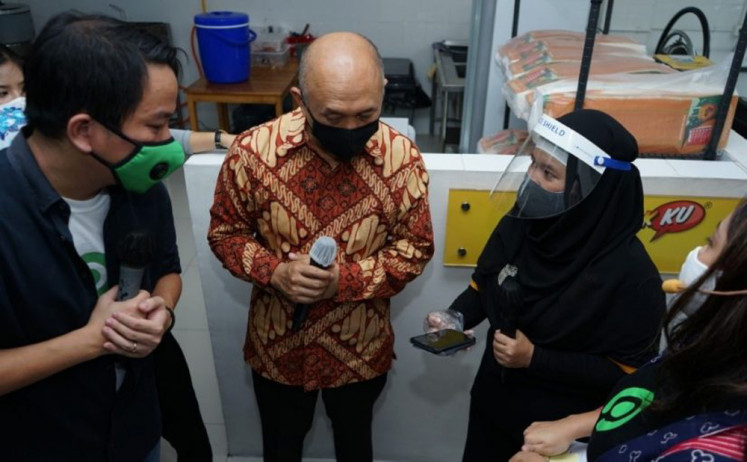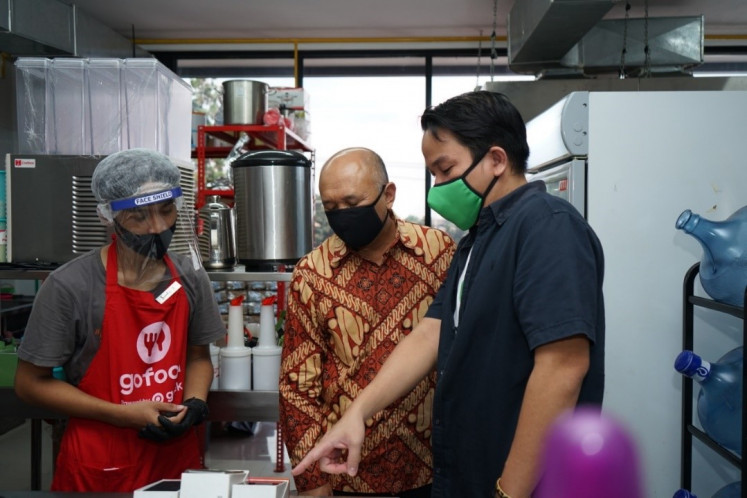
Culinary micro, small and medium enterprises (MSMEs) have been one of the most vulnerable sectors amid the COVID-19 pandemic. A time when, to observe physical distancing and restrictions on large social gatherings, people have restrained themselves from socializing and eating outside their homes. Furthermore, currently restaurants and various outlets are advised to serve takeout and delivery requests only. Needless to say, this has brought down the revenues of these culinary MSMEs.
A survey by the Cooperatives and Small and Medium Enterprises Ministry found that food merchants have been especially devastated by the pandemic, with a plunge in the number of customers dining out.
Indonesian super app Gojek, a leader in Southeast Asia, has further strengthened its already ongoing efforts to push forward the businesses of culinary MSMEs and scale their businesses up in various support initiatives that go beyond technology through a solution: a cloud kitchen facility called Dapur Bersama (Common Kitchen).
Dapur Bersama, one of Gojek’s latest innovations, seeks to help culinary MSMEs to cut their operational expenses and to expand their business to other regions, bringing their business closer to consumers, as they can optimize the location for delivery service by Gojek drivers, with an easier and more efficient pick-up system set by Gojek. It is a fully equipped working space, complete with various basic kitchen utilities, and is integrated with Gojek’s delivery technology and services.
As an overview, GoFood’s cloud kitchen facility provides several benefits to Gojek’s merchant partners, namely:
Since its launch in October 2019, Dapur Bersama is now operating across 27 locations, covering Jakarta and its satellite cities, Bandung in West Java and Medan in North Sumatra. Currently, these cloud kitchens are capable of accommodating GoFood’s 250 culinary merchant partners, 80 percent of which belong to the MSMEs category.
According to GoFood’s data in May 2020, since joining Dapur Bersama, these culinary merchants have been able to boost transactions by 70 percent.

Gojek’s Dapur Bersama also run their operations in strict compliance with health, safety and hygiene requirements suggested by the Indonesian Food and Drug Monitoring Agency (BPOM). Since the coronavirus outbreak was announced, it has also applied health and hygiene protection measures as recommended by the World Health Organization (WHO).
Indonesian Cooperatives and Small and Medium Enterprises Minister Teten Masduki visited one of GoFood’s Dapur Bersama located in Bintaro, South Jakarta, on July 9 to observe the business in practice.
Upon his visit, Teten said the ministry would keep encouraging culinary MSMEs to constantly and rapidly adapt to the rapid changes in the business landscape, in order to gain a competitive advantage in the market.
He commended GoFood’s Dapur Bersama facility for helping these merchants adapt to the current situation, while preparing them to leverage their businesses to win business competition in the culinary field.
“I really applaud this business model development created by GoFood, which can help even more MSMEs grow together,” he continued.
He further emphasized that GoFood’s cloud kitchen service was aligned with the vision of the ministry’s common production house initiative, which also seeks to provide these culinary MSMEs a space to conduct their businesses with higher cost efficiency, since these spaces help these culinary merchants reduce their space rental fees, among other savings.
“For instance, both initiatives attempt to facilitate a positive business performance among MSMEs with adequate basic infrastructure which can help them reduce operational costs, while also helping these merchants tap into GoFood’s wide network of business partners to exchange knowledge and best practices,” Teten said.
“Not to mention that Gojek’s holistic standards and competent ecosystem could support these MSMEs in their effort to create a more efficient and beneficial supply chain,” he continued.
Gojek co-chief executive officer Andre Soelistyo asserted that the cloud kitchen facility sought to bring down operational expenditure for these culinary MSMEs, specifically by cutting down on rental and expansion fees as well as infrastructural burden.
Andre added that Gojek had committed itself to becoming local MSMEs’ best growth partner.
“We have consistently provided comprehensive solutions to help MSMEs adapt their businesses amid a changing landscape, while sustaining their growth by expanding their markets using the digitalization process,” Andre said.
“Starting from providing a technology which makes business operational management easier to providing logistics and payment platforms as well as the cloud kitchen, we provide well-rounded solutions to our MSMEs partners, which serve as the backbone of the Gojek family,” he continued.
Andre went on to say that in the future, GoFood would always come up with innovations to continue sustaining the businesses of its culinary partners, by providing holistic solutions that went beyond merely technology, but also marketing strategies, consumer behavior and market dynamics insight, to help these merchants thrive.
Besides praising Gojek for its cloud kitchen innovation, Teten also applauded the super app for its many innovations in its GoFood services to help culinary MSMEs thrive, including the GoFresh feature, a marketplace service matching various MSMEs that supply food products with buyers. As part of GoFood and the ministry’s ongoing collaborations to support local MSMEs, several cooperatives that are beneficiaries of the ministry’s development program will soon join GoFresh to start providing merchants their much-needed raw food materials in these cloud kitchens.